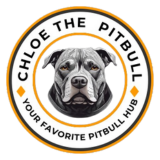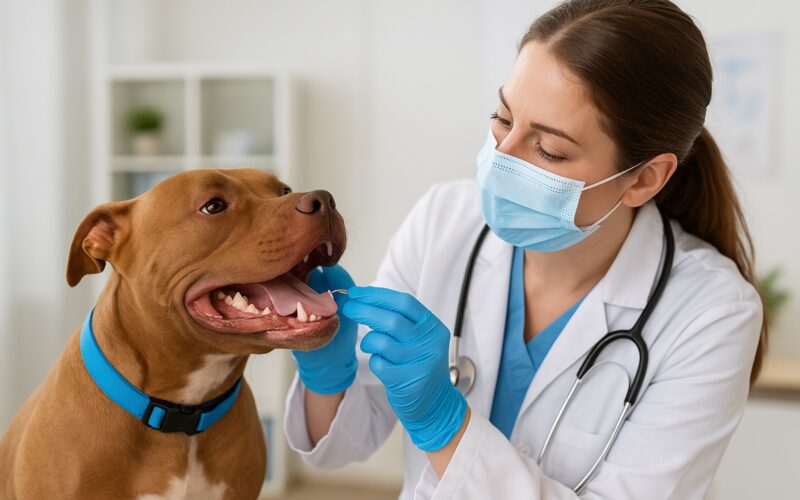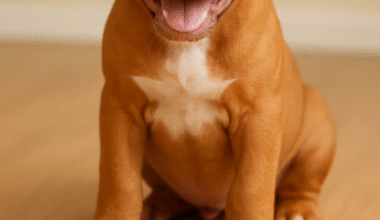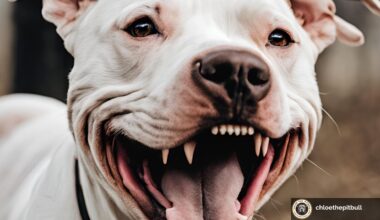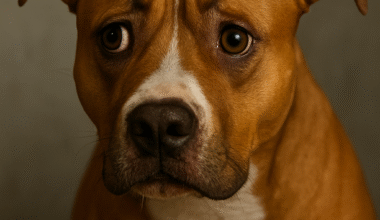Did you know that over 80% of dogs show signs of dental disease by the age of three? For pit bull owners, this is especially important—our pups are full of energy, love to chew, and often hide pain until it’s advanced. That means by the time you notice bad breath, bleeding gums, or loose teeth, your pit bull’s dental health could already be at risk.
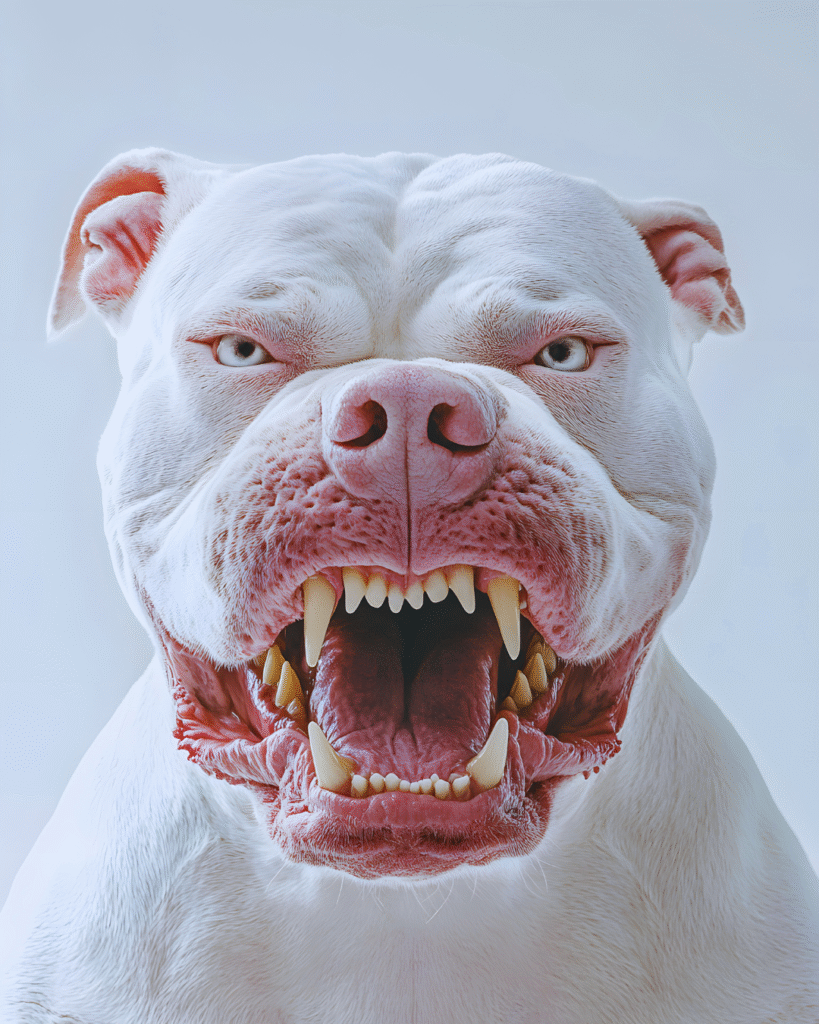
The good news? With a few simple habits built into your yearly routine, you can protect your pit bull’s smile, prevent painful dental problems, and keep them healthy for years to come. In this post, we’ll walk through 6 must-do yearly dental health habits for pit bulls that every caring owner should know. Think of it as your pit bull’s yearly smile checklist—straightforward, practical, and easy to follow.
Why Dental Health Matters for Pit Bulls
Dental Health and Your Pit Bull’s Overall Well-Being
When most owners think about their pit bull’s health, they focus on diet, exercise, and vet visits—but dental health for pit bulls is just as critical. Strong, healthy teeth aren’t just about a nice smile; they directly affect your dog’s ability to eat, play, and live comfortably. Poor dental care can cause discomfort, but more importantly, it can lead to serious health problems that impact the entire body.
Risks of Ignoring Dental Health
Neglecting your pit bull’s dental health can result in:
- Gum disease (periodontal disease): The most common issue, leading to swollen gums, tooth loss, and pain.
- Tooth fractures: Pit bulls are strong chewers, making them more prone to cracked or broken teeth if dental care is not monitored.
- Systemic infections: Bacteria from untreated dental disease can enter the bloodstream, spreading to vital organs like the heart, liver, and kidneys.
Over time, what starts as plaque buildup or mild bad breath can escalate into severe dental problems that reduce your pit bull’s quality of life.
The Emotional Impact on Your Pit Bull
Healthy teeth mean more than fresh breath—they mean your pit bull can chew comfortably, enjoy their favorite toys, and maintain the energy they’re known for. A pit bull with strong dental health is happier, more active, and free from the silent pain of untreated oral disease. By making dental health for pit bulls a top priority, you’re not just protecting their mouth—you’re protecting their entire well-being.
6 Must-Do Yearly Dental Health Habits for Pit Bulls
When it comes to keeping your pit bull healthy, a yearly routine built around dental health is just as important as vaccinations or exercise. These six habits are practical, effective, and easy to implement, ensuring your dog’s teeth and gums stay strong all year long.
1. Schedule a Professional Dental Cleaning Once a Year
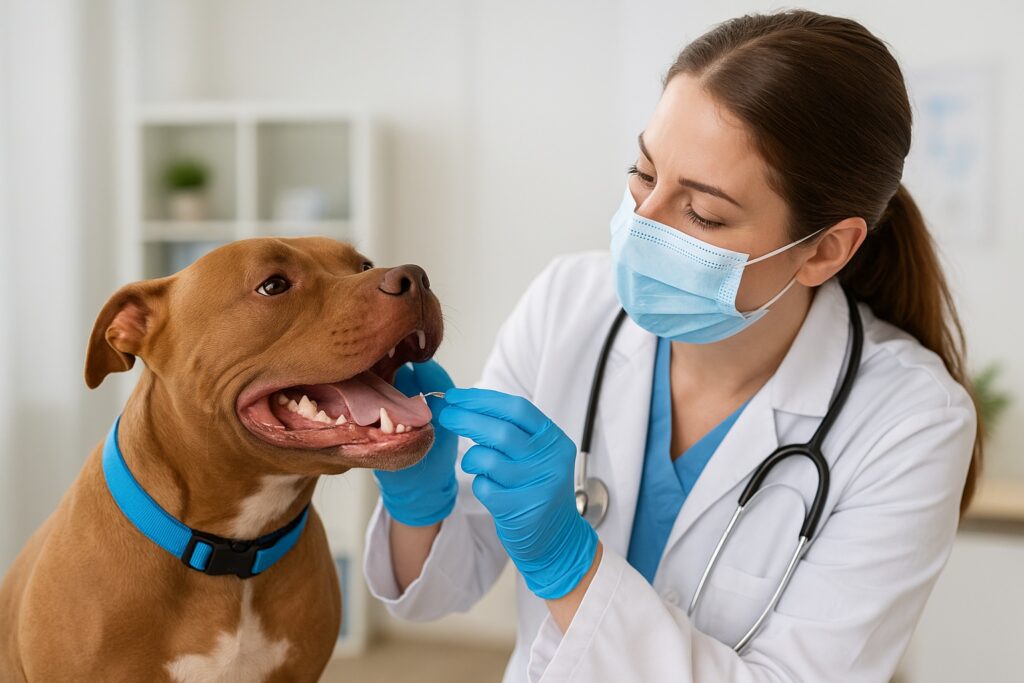
Even with daily brushing, tartar and plaque can build up over time, especially on the back teeth where brushes don’t always reach. That’s why a yearly professional dental cleaning at your vet is essential for your pit bull’s dental health.
During a professional cleaning, the vet uses special tools to remove hardened tartar, polish the teeth, and check for hidden issues such as cracks, infections, or gum disease. They can also take dental X-rays to see below the gumline—something no at-home care can achieve.
Benefits of yearly professional cleanings:
- Removes plaque and tartar that daily brushing misses
- Detects early signs of gum disease or tooth damage
- Prevents painful infections and costly treatments later
- Keeps your pit bull’s breath fresh and pleasant
Think of it as the dental deep-clean your pit bull needs once a year to keep their smile strong and pain-free.
2. Get a Dental Health Check During Regular Vet Visits
Most pit bull owners take their dogs for an annual wellness exam, but not all realize that dental health should be a routine part of that check-up. A simple mouth exam during your pit bull’s vet visit can reveal early warning signs before they become major problems.
Ask your vet to:
- Inspect the gums for redness or swelling
- Look for chipped, broken, or missing teeth
- Check for signs of oral tumors or abscesses
- Smell for unusual odors that may indicate infection
A yearly exam gives you peace of mind and ensures your pit bull’s dental health is being tracked consistently. If your vet doesn’t automatically include a mouth check, don’t hesitate to request one.
3. Refresh Their Daily Brushing Routine
Daily brushing is the gold standard for dog dental care, but it’s easy to fall into a routine where the tools get worn down or the technique gets sloppy. Once a year, review and refresh your pit bull’s brushing habits.
Steps to refresh your brushing routine:
- Replace toothbrushes every 3–4 months; at minimum, once a year
- Use dog-safe toothpaste—never human toothpaste
- Introduce brushing slowly if your pit bull is resistant
- Aim for short, positive sessions with plenty of praise
For pit bulls, who are strong chewers with powerful jaws, having healthy teeth makes chewing safer and more enjoyable. By keeping brushing consistent, you support long-term dental health and reduce the risk of gum disease.
4. Update Chew Toys and Dental Treats
Chew toys and dental treats aren’t just for entertainment—they play a vital role in your pit bull’s dental health. Over time, however, toys can wear down or become unsafe, which is why a yearly refresh is important.
Best dental-friendly toys and treats include:
- Rubber chew toys that massage gums and scrape away plaque
- Dental sticks designed to reduce tartar buildup
- Natural raw bones (supervised to prevent breakage)
Avoid giving your pit bull overly hard items like cooked bones, rocks, or antlers, which can cause painful fractures. Replacing old toys once a year keeps chewing safe, fun, and beneficial for their teeth.
5. Adjust Their Diet for Strong Teeth
Nutrition plays a huge role in your pit bull’s dental health. At least once a year, review their diet to make sure it supports oral hygiene as well as overall health.
Many pit bull owners find that dry kibble with a crunchy texture helps reduce plaque compared to soft food, though the best choice depends on your dog’s needs. You can also add supplements designed to support dental health, such as water additives, dental powders, or specially formulated dental diets.
Dietary adjustments to consider:
- Choose kibble that promotes chewing and scrubbing action
- Incorporate raw vegetables like carrots for natural cleaning
- Ask your vet about dental-specific food options
- Consider supplements if your pit bull is prone to tartar buildup
A balanced diet not only fuels your pit bull’s body but also contributes to a healthier mouth.
6. Monitor and Record Changes in Their Mouth
Finally, one of the most overlooked yearly habits for pit bull owners is monitoring and recording changes in their dog’s mouth. Because dental problems often develop slowly, having a record makes it easier to spot trends and get treatment early.
What to look for:
- Bad breath that persists even after brushing
- Red, swollen, or bleeding gums
- Reluctance to chew toys or eat hard food
- Pawing at the mouth or drooling excessively
Take clear photos of your pit bull’s teeth once a year and compare them over time. This simple step can help you and your vet track changes and prevent small dental issues from becoming serious health threats.
Common Dental Health Problems in Pit Bulls
Understanding the most common issues helps pit bull owners take proactive steps to protect their dogs. While many of these problems are preventable, they are also among the leading reasons vets recommend prioritizing dental health.
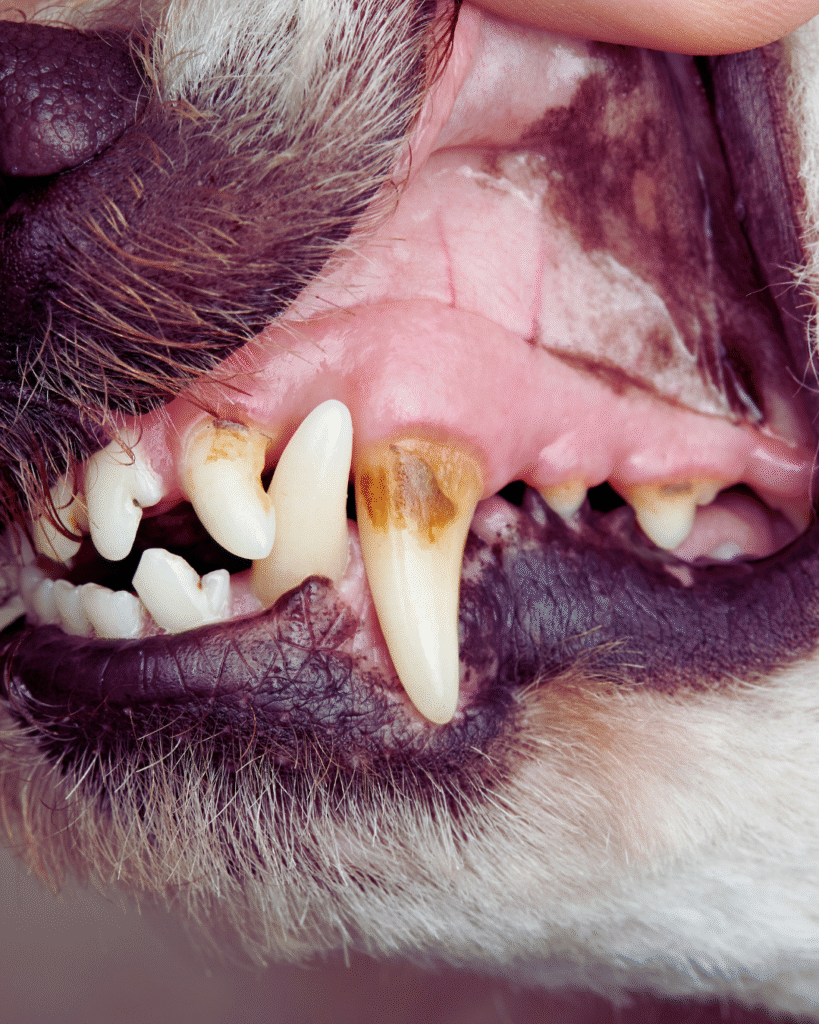
Periodontal Disease
The most common dental health problem in pit bulls is periodontal disease, which starts as plaque buildup and progresses into painful gum infections. Left untreated, it can cause gum recession, tooth loss, and bacteria spreading into the bloodstream. Regular cleanings and home care are the best defenses.
Tooth Fractures
Pit bulls are strong chewers, and while this is great for exercise, it also makes them prone to fractured teeth. Chewing on hard bones, antlers, or even rocks can cause cracks or breaks. These fractures are not only painful but can also expose the root to infection, making dental health checks essential.
Bad Breath
While many owners dismiss it as “dog breath,” persistent odor often signals underlying dental problems. Bad breath in pit bulls is usually a warning sign of tartar buildup, gum disease, or hidden infection. Fresh breath is one of the easiest indicators of good dental health.
Gum Infections
Swollen, red, or bleeding gums are clear signs of infection. Gum infections can spread quickly, making eating painful and potentially leading to systemic health issues. Spotting these signs early helps preserve both oral and overall health.
Cavities (Though Rare)
Unlike humans, cavities are less common in dogs, but pit bulls can still develop them under certain conditions. Cavities weaken teeth and, if untreated, may require extraction. Including them in yearly dental health checks ensures nothing is missed.
Tips to Make Dental Health Care Easier for Pit Bulls
Keeping up with your pit bull’s dental health may feel overwhelming, but it doesn’t have to be. With a few smart strategies, you can make oral care a routine your dog enjoys—and one you’ll find easy to stick with year after year.
Start Small and Be Consistent
If your pit bull isn’t used to brushing, start with short, gentle sessions. Touch their mouth, let them taste the toothpaste, and slowly build up to brushing a few teeth at a time. Over time, your dog will learn that dental care is just another part of daily life. Consistency is more important than perfection—regular small steps make a big difference for dental health.
Use Flavored Dog Toothpaste
Human toothpaste is unsafe for dogs, but pet-safe toothpaste comes in tasty flavors like chicken, beef, or peanut butter. These flavors make brushing less of a chore and more of a treat. Many pit bull owners find flavored toothpaste transforms dental care from a struggle into a bonding moment.
Make Dental Care a Positive Experience
Turn brushing into play. Offer praise, belly rubs, or a favorite toy after each session. Pairing dental health routines with positive rewards helps your pit bull look forward to the process rather than resist it.
Incorporate Chews and Toys
Not all dental care has to involve a toothbrush. Durable chew toys, dental sticks, and safe raw bones all help reduce plaque while keeping your pit bull entertained. These tools make it easier to support dental health even on days when brushing isn’t possible.
Set Reminders and Track Progress
Life gets busy, and it’s easy to forget. Set a reminder on your phone for brushing sessions or schedule a weekly “dental check” day. Some owners even take progress photos of their pit bull’s teeth, making it easier to notice improvements—or spot issues before they worsen.
Making dental health care part of your pit bull’s daily and yearly routine not only protects their teeth but also strengthens your bond with them. With patience and consistency, what once felt difficult will soon become second nature.
Final Thoughts: Protecting Your Pit Bull’s Dental Health Year After Year
Caring for your pit bull’s dental health doesn’t have to be complicated—it just takes awareness, consistency, and a yearly routine. From professional cleanings and dental-friendly diets to daily brushing and safe chew toys, each step you take plays a big role in keeping your dog happy, pain-free, and full of energy.
Ignoring oral care may seem harmless at first, but small issues like tartar buildup or bad breath can quickly progress into gum disease, infections, or tooth loss. By making dental health a priority, you’re not only protecting your pit bull’s smile—you’re safeguarding their overall well-being.
As a pit bull owner, you already know how much your dog relies on you for love and care. Adding these yearly dental health habits to your routine is one of the most important ways to return that loyalty.
💡 Your next step:
- Schedule your pit bull’s next dental check-up with your vet
- Refresh their toothbrush, toothpaste, and chew toys today
- Share this guide with fellow pit bull owners who care about their dog’s smile
Because at the end of the day, a healthy mouth means a healthier, happier pit bull—and that’s something every owner wants.
